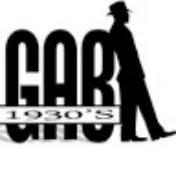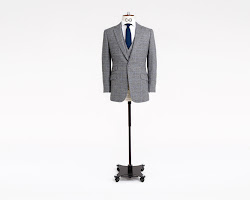"Bespoke" is a term deeply rooted in British history, originating from the world of tailoring in the 17th century. The term is derived from the verb "bespeak," meaning to "speak for something," or in other words, to order or reserve an item. In the context of tailoring, the term referred to a customer selecting a piece of cloth that was then 'spoken for' or reserved to be made into a suit.
Origin in the Tailoring Industry
The term "bespoke" was first used in the tailoring industry, specifically on London's Savile Row, often referred to as the "golden mile of tailoring". In this setting, "bespoke" denoted a suit that was custom-made for a specific customer. Unlike ready-to-wear garments, a bespoke suit involved a meticulous process of measurements and fittings, ensuring a perfect fit that was tailored to the wearer's body and preferences.
Furthermore
Here are some of the key features of a bespoke suit:
- It is made from the finest materials, such as wool, cashmere, or silk.
- It is cut to the wearer's exact measurements, ensuring a perfect fit.
- It is tailored to the wearer's body type, flattering their figure.
- It is made with the utmost attention to detail, with no shortcuts taken.
- It is a one-of-a-kind garment, made specifically for the wearer.
Bespoke suits are typically more expensive than ready-to-wear suits, but they are worth the investment for those who want a truly unique and perfectly fitting garment.
Here are some of the benefits of getting a bespoke suit:
- It is a one-of-a-kind garment that is made specifically for you.
- It fits perfectly, flatters your figure, and makes you look your best.
- It is made from the finest materials and construction, so it will last for many years.
- It is a statement piece that will make you stand out from the crowd.
- It is a great investment that will pay off in the long run.
If you are looking for a truly unique and perfectly fitting suit, then a bespoke suit is the way to go. It is a more expensive option, but it is worth the investment for those who want the best.
Expansion to Other Industries
Over time, the concept of "bespoke" expanded beyond the world of tailoring. Today, it is used in various industries to denote custom-made or tailor-made products or services.
1. Bespoke Cars: In the automotive industry, bespoke refers to cars that are custom-built according to the buyer's specifications. Luxury car manufacturers like Rolls-Royce and Bentley offer bespoke services, allowing customers to customize everything from the car's exterior color to the type of wood used in the interior.
2. Bespoke Shoes: Bespoke shoemaking involves creating shoes that are specifically designed for a customer's feet. This can involve taking precise measurements, creating custom lasts (the mold around which the shoes are formed), and allowing the customer to choose materials and design details.
3. Bespoke Jewelry: In the jewelry industry, bespoke refers to pieces that are custom-designed and made for a specific client. This can involve everything from creating a unique engagement ring to designing a piece of jewelry around a particular gemstone.
4. Bespoke Furniture: Bespoke furniture is designed and made to order, allowing customers to specify dimensions, materials, and design details. This ensures that the furniture fits perfectly in the customer's space and matches their style and preferences.
Books and Journals Written on the term Bespoke
"Bespoke" is a term that has been widely explored in literature, with numerous books and journals discussing its historical origins, cultural implications, and applications in various industries. Here are a few noteworthy examples:
1. "Bespoke: The Men's Style of Savile Row" by James Sherwood:** This book provides a comprehensive history of bespoke tailoring, focusing on the famous Savile Row. It explores the craft and artistry behind bespoke tailoring and its influence on men's fashion.
2. "The London Cut: Savile Row Bespoke Tailoring" by James Sherwood:** Another book by Sherwood, this volume provides a detailed look at the bespoke tailoring process, including the design, cutting, and fitting stages. It also profiles several of Savile Row's most famous tailors.
3. "The Master Tailor's Guide to Perfect Fit: A Detailed Guide to Fitting Tailored Garments" by Rory Duffy:** This book is a practical guide to bespoke tailoring, providing step-by-step instructions on how to create perfectly fitted garments.
4. "Bespoke: Furniture from 101 International Artists" by E. Ashley Rooney:** This book explores the concept of bespoke in the context of furniture design, showcasing the work of 101 international artists who create custom, one-of-a-kind pieces.
5."The Journal of Modern Craft" (Volume 3, Issue 1):** This issue of the journal features an article titled "Bespoke: An Approach to Craft and Design," which explores how the concept of bespoke is being applied in contemporary craft and design practices.
6. "Bespoke: Source Book of Furniture Designer Makers" by Betty Norbury:** This book provides an overview of the bespoke furniture industry, profiling a range of designer-makers and their unique creations.
These books and journals provide valuable insights into the term "bespoke," exploring its historical roots, cultural significance, and modern applications. They illustrate how the concept of bespoke has evolved and expanded over time, while also highlighting the enduring appeal of custom-made, individually tailored products and services.
Summary
"Bespoke: A Journey from Savile Row to Modern Customization" traces the evolution of the term "bespoke" from its origins in the 17th-century British tailoring industry to its widespread use in various modern industries. The term, meaning 'spoken for', was first used to refer to custom-made suits crafted for specific individuals on London's Savile Row. Over time, the concept has expanded beyond tailoring to denote any custom-made or tailor-made product or service. Today, the term "bespoke" is used in industries such as automotive, shoemaking, jewelry, and furniture, symbolizing a commitment to craft, quality, and individuality. The use of "bespoke" in these sectors represents the ultimate in customization, offering customers products and services uniquely tailored to their preferences and specifications.
In conclusion, "bespoke" has a rich history and has come to symbolize the ultimate in customization and personalization across various industries. It represents a commitment to craft, quality, and individuality, offering customers products and services that are uniquely their own.








